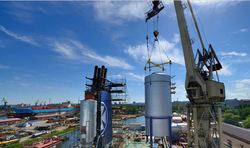Scrubbers are tried, tested and still getting better

Exhaust scrubbing technology already has a 60-year track record, and will become better yet, its enthusiasts insist.
‘Current exhaust gas cleaning systems have proven themselves to be reliable, effective means of dramatically improving air emissions without impacting the marine environment,’ says DFDS’s Poul Woodall.
ENTHUSIASTS MAINTAIN THAT SCRUBBERS WILL CONTINUE TO EVOLVE AS THE INDUSTRY MOVES TOWARDS EVER-TOUGHER ENVIRONMENTAL TARGETS.
ONLY a small minority of the operators who must comply with the International Maritime Organization’s sulphur cap have opted to use scrubber.
It is still a difficult call to make, at least until the price of low-sulphur fuel oil settles down into established parameters.
But what we do know is that exhaust scrubbing technology is tried and tested, has been around for more than 60 years and successfully used on ships for over a decade.
If there are still technical quibbles, enthusiasts maintain that scrubbers will continue to evolve as the industry moves towards ever-tougher environmental goals in the longer term.
The idea of using water droplets to scrub exhaust gases clean was first explored in the 1950s, and rapidly became an approved and accepted technology in many shore-based industries, most notably electricity generation.
Not only did these systems often use seawater as the wash water, but this was even seen as advantageous, because its salinity negated the need to add further chemicals.
After wet scrubbers proved their worth by their contribution to environmental mitigation on land, engineers naturally began to think about they could be applied to marine use.
By the time Sulphur Emission Control Areas arrived in May 2005, under Marpol Annex VI, the regulatory imperative began to concentrate minds.
Vessel operators realised that the use of scrubbers could allow them to continue using existing fuel oils rather than to switch to more expensive ultra-low sulphur fuels, namely refined distillate products with a sulphur content of less than 0.1%.
The ferry sector seems to have led the way, with the Clean Shipping Alliance 2020— an industry grouping of commercial and passenger shipping companies — highlighting the installation of an exhaust gas cleaning system on board DFDS’s Ficaria Seaways, which has achieved more than 50,000 running hours since 2009.
As the 37,939gt ro-ro operates inside the stringent European Seca on the Gothenburg-Immingham route, it was decided to fit an Alfa Laval PureSOx system.
“The installation has prevented a substantial amount of sulphur emissions from entering the atmosphere,” says DFDS’s director for environment and sustainability Poul Woodall.
Data from the high-sulphur heavy fuel oil-burning Ficaria Seaways shows that during the 10-year period, SOx emissions have been kept at only 0.05%.
“Had the vessel been trading on compliant fuel during these 10 years, then SOx emissions would have been almost 60 times higher,” he adds.
This has been verified in tests carried out in 2012 by the Danish Environmental Protection Agency, which concluded that on average only half the SOx permitted in the Seca was emitted through the scrubber system. Emissions equalled a sulphur content in fuel of 0.05% for the vessel.
Essentially, the vessel emitted 150 tonnes less of SOx than if it had been operating on compliant 0.1% marine gasoil.
The tests also found reported particulate matter numbers were in the 31%-53% range, while mass was reduced by up to 55%.
“All in all, some very good statistics for those of us who are concerned about air quality and system performance,” says Mr Woodall.
The operational performance of the scrubber was verified from internal measurements carried out by DFDS, which indicated scrubber downtime of less than 0.002% during the 12-month period to July 1, 2019. DFDS now has scrubber technology on board 28 vessels with 10 more on order.
However, Mr Woodall believes that current scrubber technology is not enough, especially if the IMO’s target of 50% reduced greenhouse gas emissions by 2050 (compared with the base year of 2008) is to be met. Ultimately there will have to be an alternative to fossil fuels.
“However, until such alternatives are identified and developed for practical use, the current exhaust gas cleaning systems have proven themselves to be reliable, effective means of dramatically improving air emissions without impacting the marine environment and will continue to exceed the international air quality requirements in thousands of ships worldwide,” says Mr Woodall.
Meanwhile, scrubber manufacturer Yara Marine believes that scrubbers have further to go. At the very least, research work into the total benefits of exhaust cleaning systems needs to continue.
“Shipping, and any other industry that uses environmentally sound technologies that are focused on long-term sustainability, need to be allowed to continue their research and growth, especially when such solutions make environmental and economic sense,” Yara says.
Shipping remains complicated, and it would be wrong to back one environmental technology in favour of another, which could reinforce the idea that shipping does not want to do the right thing.
“As an industry we are in a significant period of transformation and we need to be unreservedly optimistic about our goals and efforts.
“There is no denying that owners need the solutions which technology companies invest heavily in finding and developing on their behalf. Therefore, we need to work together.”